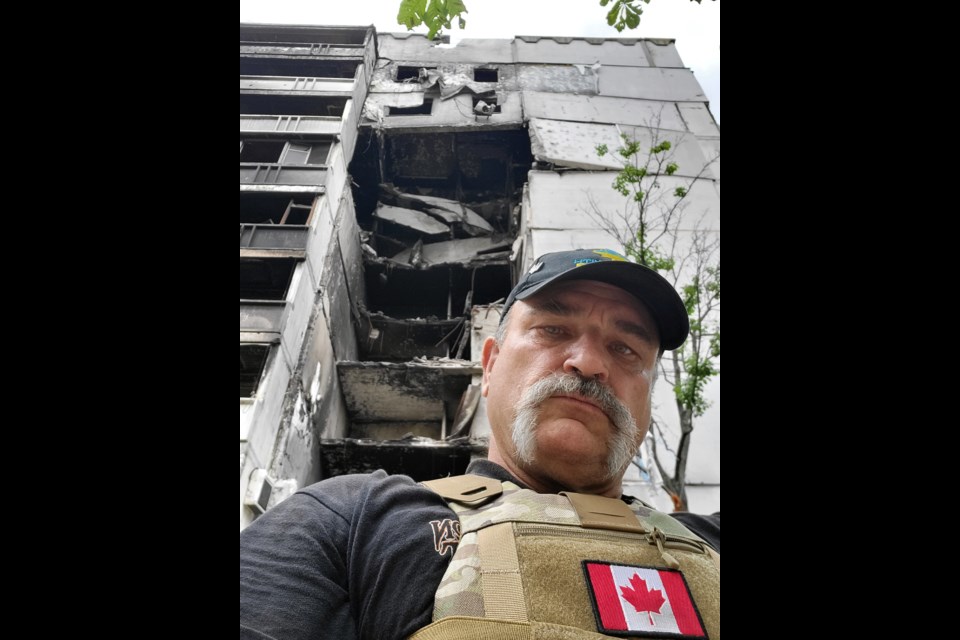Terry Malchuk joined the military a year after he graduated from Coquitlam’s Centennial Secondary in 1981.
The economy was bad and he needed a job, so he signed up with the Princess Patricia’s Canadian Light Infantry.
After his training in Winnipeg in 1984, he was stationed in Germany for four years with NATO; he also did a tour in Cypress before retiring as a corporal in 1991.
"In Germany, it was all about the Soviet Union," Malchuk remembered. "We were at war strength there at the time."
In February, when he heard about Russia’s invasion in Ukraine, the army veteran pulled into action.
He felt World War III was next.
"Even if you are a vet and now a civilian, you still consider yourself to be in the military. You have a duty."
What’s more, Malchuk also has Ukrainian heritage on his father’s side (His father, Fred Malchuk, is a Coquitlam resident and his parents were from Brody in western Ukraine).
With those pulls in mind, Malchuk boarded a plane in April for the war-torn country to help Ukrainians on the ground during his three-month stay.
First, he was named second-in-command of a humanitarian organization called H.U.G.S. (Helping Ukraine Grassroots Support) that distributes food and medical donations to Ukrainians, including in Odessa and Kyiv.
For the first five weeks, they lived in an empty school with displaced Ukrainians. They had one shower to share.
There, he heard the emotions in the children’s voices. "They have hardships. Their homes have been blown up," he said.
But when the H.U.G.S. work fell apart, Malchuk co-founded a non-profit group in Canada and Ukraine called H.E.R.O. — Humanitarian Emergency Response Operations Society — with some H.U.G.S. members.
Today, it is one of the few registered charities in the Ukraine, he said.
"You don't need to be a large organization to do things over there," he said. "In fact, it's best to be smaller to get things done efficiently."
Malchuk, an Abbotsford resident, told the Tri-City News that he did missions with H.E.R.O. members in dangerous areas.
In fact, when he left the country in late July, his team was 26 km from the Russian front, close to the Zaporzhzhia nuclear power plant in southeastern Ukraine — the largest station in Europe that is now under Russian control.
Malchuk and his team were staying at a member's condo, which was one the edge of the city facing east. "Every night, we would watch missile strikes happening," he said. "You could see towns burning."
Malchuk said with so many checkpoints and Russian saboteurs, it’s hard to get around Ukraine safely.
Still, working under the guidance of World Central Kitchen, they've been able to fulfill their missions of delivering food, medical aid and supplies to Ukrainians in or around Zaporzhzhia and Kharkiv, as well as a hospital in Kryvyi Rih, the largest city in central Ukraine.
H.E.R.O. has also helped to make IFAK (Individual First Aid Kits) for Ukrainian solders, and its members have worked with Task Force Yankee in Ukraine, which is an American non-governmental organization.
Malchuk said once the paperwork is approved, H.E.R.O. will be able to distribute the donations directly in the red-zone areas that are heavily controlled.
Malchuk, who plans to return to Ukraine next year, said his organization is on a fundraising drive to assist with humanitarian response in the devastated country.
Coquitlam resident Tamara Moldon is sourcing donated medical gear.
Last month, H.E.R.O. brought in $8,000 at the Chilliwack Sunflower Festival, and it sent a 40’ shipping container to Ukraine with the help of Roman Sawychy, the president of Ukrainian–Canada Social Services in Vancouver.
While donations of supplies are welcome, cash for gasoline is especially needed, Malchuk said, to get the provisions and equipment out.
"We could do more missions if we had gas money. Sometimes, it's just once a week, but we want to do two or three times a week."
He added, "We really need donations for our organization. It’s really hard for us to raise money. I’m not used to it. I'm good to go into the battle zone with all the food and medical supplies, but being back home, it's a different story."
"We need to show Ukrainians that people over here care about what’s happening in their country."
To learn more about the H.E.R.O. Society and donate, you're encouraged to visit H.E.R.O.'s website or email [email protected].





